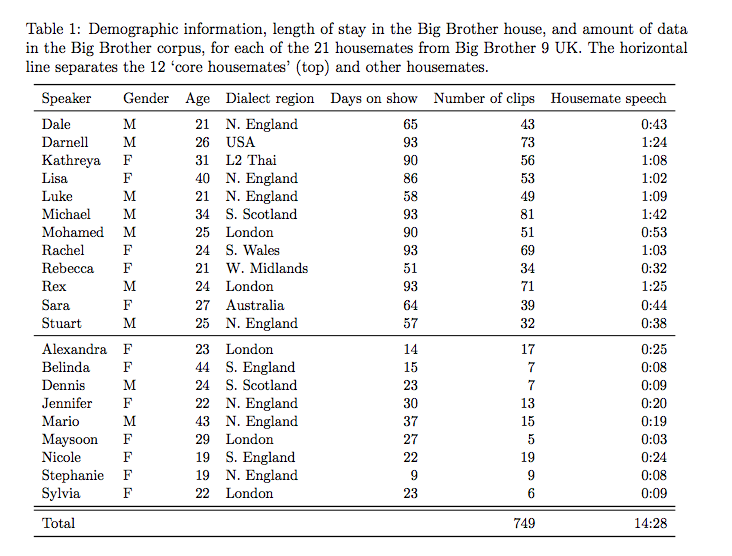Why Linguists Watched the Same Season of ‘Big Brother’ for 6 Years
Credit to Author: Claire Downs| Date: Wed, 06 Sep 2017 17:07:01 +0000
New scientific developments may explain your friend’s irritating British accent she picked up after studying abroad in London. McGill University linguist Morgan Sonderegger and colleagues Max Bane and Peter Graff published a new study in the journal Language that examines how accents can change in a group of people living in a confined environment over three months. Instead of waiting for test groups and paid participants, Sonderegger mined data from an unexpected and hilariously perfect source: Big Brother 9 UK. To do this, the international team painstakingly examined footage of the reality show, minute-by-minute, for nearly six years.
The capacity for our ability to switch accents has been well-documented by researchers. Short-term changes (when someone slips into another’s accent mid-conversation) have been shown to be a sign of empathy and imitation for our conversation partner. Several reports pointed out Hillary Clinton’s newfound Southern accent while on the campaign trail in South Carolina in 2015. Studies of long-term accent change have examined how our exposure to other accents over a period of years or a lifetime can leads to shifts in dialect. Madonna’s ever-evolving British accent after years spent living abroad is well-known and often a source of mockery.
Until now, studies that examine medium-term accent changes—those that occur over days, weeks and months —have been few and far between, due to environmental variables making results-oriented research difficult.
“Medium term is key for understanding whether anything that happens during the course of a conversation or your interactions in daily life, whether those interactions can happen over time and actually impact the broader structure of the language that everyone is speaking,” Sonderegger told me on the phone.
According to the researchers, Big Brother 9 UK, which aired in 2008, provided ideal conditions for examining these linguistic changes, since international contestants with varying accents and speech patterns are confined to the same house for months at a time. This lack of contact with the outside world, according to the paper, makes the Big Brother house a “linguistically closed system.”
Using the 12 permanent contestants’ “diary room” segments, confessionals recorded solo, the researchers transcribed 14.5 hours of audio and judged their changing speech patterns on a linguistic rubric. They also utilized blogs commissioned by British newspaper, The Sun, which paid writers to describe a 24-hour live feed of the show at the time. By text mining that data, Sonderegger and his team were able to have records of the amount of interaction between the various contestants.
The team found that by tracking people day-to-day, our speech patterns and accents fluctuate on an almost daily basis, depending on who we interact with. But more often than not, none of these small changes add up to produce permanent effects over months. If a person on the show fell into the minority and did show permanent changes, it was when they were confronted repeatedly with an accent drastically different than their own.

One big exception was in the case of a couple, or the two housemates who felt “the most positivity toward each other.” According to Sonderegger, after Big Brother participants Luke and Rebecca became romantically involved, their accents “clearly shifted toward each other,” meeting at a midpoint. The study reads like a juicy Big Brother recap, built for linguistics fanatics: “On day 37, they admit their mutual interest to each other, and afterward form an inseparable couple.” After that, the researchers reported, is when their accents began to converge. “On the whole, the pair’s realizations of phonetic variables become markedly more similar over time—especially during their period of most intense interaction, after their relationship qualitatively shifts (days 37–51)—suggesting convergence.”
As for determining who will be a “changer” versus a “non-changer,” age may have something to do with it. The oldest contestants in the house showed little change over the season, while the youngest ones remained the most flexible.
Manual coding and transcription was aided by the use of a spectrogram and speech recognition software, yielding an amount of data that Sonderegger says is “innovative” in language research. He explained, “We went in and looked at the waveforms by hand, but to some extent we automated the process using machine learning tools so we would have an accurate subset of data.” Sonderegger co-wrote automatic analysis software called Auto-VOT which analyzed consonants, as well as a program called FAVE (Forced Alignment and Vowel Extraction) to examine vowels.
Read more: Website That Simulates How Speech Works in Your Mouth Is So Weird and Cool
When I asked Sonderegger why he chose the ninth season of the show (which aired in 2008) over others, if it featured a broader range of accents or if he was simply fan, he laughed. “We started this project a long time ago, and at the time that was the most recent season when we we began collecting data.” Because data analysis stopped in 2015, Sonderegger said they watched the same season for nearly six years. Even hardcore BBUK fans will have to admit, that’s kind of heroic.
https://motherboard.vice.com/en_us/rss